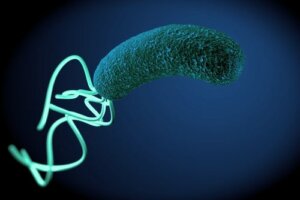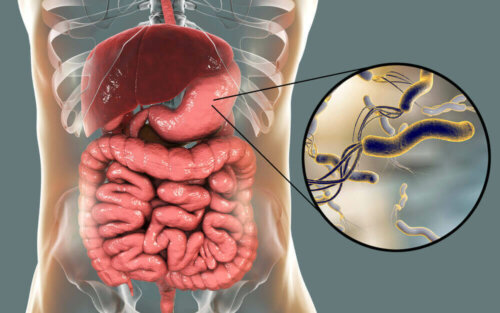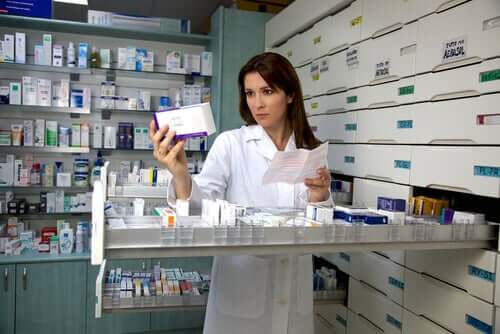A Bacteria that Causes Pain, Bloating, and Diarrhea


Written and verified by the pharmacist Lourdes Martínez
Helicobacter pylori are pathogens that can cause serious stomach problems. Among the primary symptoms are bloating and diarrhea, pain, and a burning sensation in the abdomen, upper abdominal discomfort, and nausea, among others.
This bacteria is the most common cause of gastritis and gastroduodenal ulcers (peptic ulcers), according to the MSD Manual.
It was first discovered and described in 1983 and caught public attention due to its aggressiveness upon infecting healthy patients.
Spread by contact, H. Pylori immediately sets itself up in the stomach lining or duodenum, causing major problems.
In situations where hygienic methods are not always adequate. This is because it’s easier for these bacteria to spread and affect people.
While it’s true that the incidence of infection is higher in these conditions, no one is safe from becoming ill and suffering from pain, bloating, and diarrhea. So, if someone doesn’t treat your illness properly, it could lead to chronic gastritis or dangerous ulcers.
How Helicobacter pylori spread

To date, doctors and scientists aren’t sure what causes these bacteria to spread into our bodies. However, they have some good information on relevant factors:
- This bacteria is normally contracted during childhood. It’s during this stage that we’re most vulnerable to bacteria and infections.
- Doctors tell us that almost 60% of the population already has this pathogen inside their bodies in its asymptomatic form. Furthermore, it can remain inside the body for a person’s entire life without causing any damage.
- It’s transmitted by person-to-person contact and through contaminated water and food.
- Some may never experience any symptoms, while others, upon reaching a certain age, will start to suffer from gastritis, gastric ulcers, pain, acid reflux, bloating, and diarrhea.
Symptoms of H. pylori infection such as bloating and diarrhea
As we mentioned above, these bacteria often don’t present any symptoms or signs of discomfort at all.
If you want to know for sure whether this organism is inside you, you should consult your doctor. Furthermore, they’ll be able to conduct appropriate tests.
These tests consist of analyzing the patient’s breath after ingesting a liquid that contains a non-radioactive isotope. Therefore, if the bacteria are present in the body, it’ll convert the liquid into carbon dioxide and ammonia.
The carbon dioxide passes into the blood and then the lungs excrete it. So, it’s here that your physician can detect it in the breath.
If you already suffer from digestive problems, your doctor may suggest an endoscopy to examine the lining of your stomach.
However, if this bacteria is present inside of you, certain problems are more likely to occur after age 40. These may give you a clue as to its presence:
- Gas
- Bad breath
- Nausea and vomiting
- Abdominal discomfort
- Abdominal distension
- Feeling like food doesn’t taste the same as before
- Feeling full even though you’ve eaten very little
- Dark stool or anemia (from ulcers causing damage to the stomach walls)
Also read: Natural Remedies to Treat Gastritis
Treatment for Helicobacter pylori

According to the MSD Manuel, infections caused by H. pylori are usually treated with antibiotics and a proton-pump inhibitor. The latter, combined with antibiotics, will help reduce acid production. Doctors sometimes also prescribe bismuth sub-salicylate (Pepto Bismol).
Find out more: Seven Traditional Heartburn Remedies
General dietary recommendations to avoid bloating and diarrhea
- Avoid overeating
- Choose whole wheat flour instead of refined flours
- Eat slowly, and eat moderate portions. Eating 5-6 small meals a day can be helpful.
- Rest for half an hour after eating a big meal. Don’t lie down.
- Avoid beverages that might irritate your stomach, such as carbonated drinks, alcohol, citrus juice, and tomato juice
- Avoid fried food, battered food, salsas, spicy food, and fatty, oily food

- Grill, steam, bake, or boil your food
- Drink enough water over the course of the day, 30 to 60 minutes before eating
- Eat less salt and spices to avoid irritating your stomach
- Avoid stimulants like coffee, chocolate, etc.
If you have questions about what you should be eating during your recovery, talk to your doctor.
All cited sources were thoroughly reviewed by our team to ensure their quality, reliability, currency, and validity. The bibliography of this article was considered reliable and of academic or scientific accuracy.
- Enroth, H., & Engstrand, L. (2016). Helicobacter pylori. In International Encyclopedia of Public Health. https://doi.org/10.1016/B978-0-12-803678-5.00200-9
- Ota, H., Hayama, M., Kaneko, Y., Matsumoto, T., Kawakami, Y., Kumagai, T., … Katsuyama, T. (2006). Helicobacter pylori infection. Japanese Journal of Clinical Chemistry. https://doi.org/10.1093/jac/32.suppl_A.61
- Park, S. F. (2006). Helicobacter pylori. In Emerging Foodborne Pathogens. https://doi.org/10.1533/9781845691394.2.429
This text is provided for informational purposes only and does not replace consultation with a professional. If in doubt, consult your specialist.








